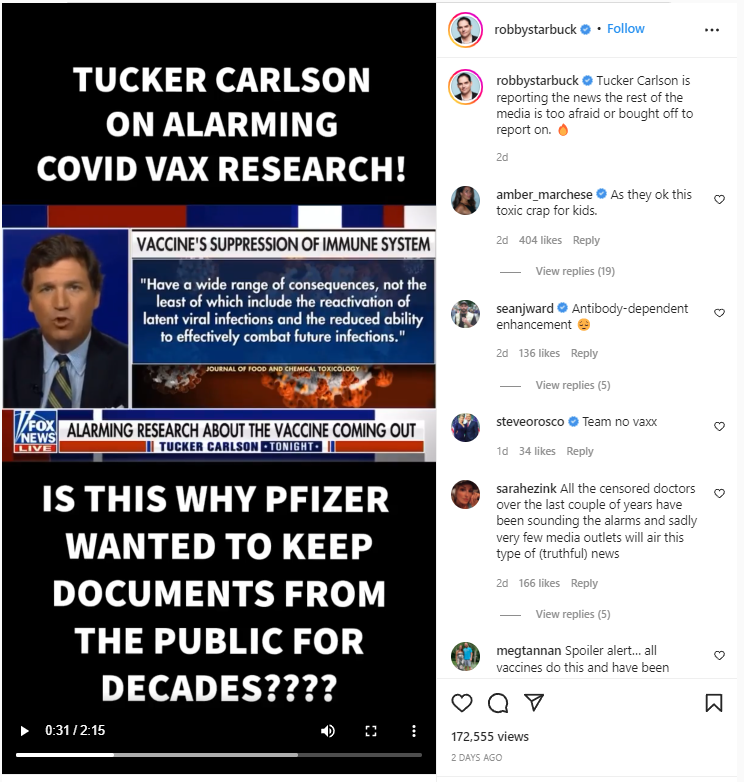Fact Check: COVID Vaccines Do NOT Suppress Immune System

Do COVID-19 vaccines suppress the human immune system? No, that’s not true: There is nothing to suggest that COVID shots have that sort of impact on the body’s defenses. “There is no clinical or epidemiological evidence that COVID vaccines generally suppress or weaken the immune system,” Dr. William Schaffner, a professor of medicine in the division of infectious diseases at Vanderbilt University Medical Center, told Lead Stories.
The claim appeared in an Instagram post and video on July 22, 2022, under the title “TUCKER CARLSON ON ALARMING COVID VAX RESEARCH!” It opened:
Tucker Carlson is reporting the news the rest of the media is too afraid or bought off to report on. 🔥
This is what the post looked like at the time of writing:
(Source: Facebook screenshot taken on Mon Jul 25 17:03:29 2022 UTC)
In just over two minutes, Carlson cites two studies (here and here) and one letter to a medical editor as evidence of how the vaccines are allegedly decimating the human immune system. The video is an excerpt from Carlson’s July 21, 2022, show on the Fox News Channel. The clip opens with a partial quote from one of the studies suggesting conditions that could be caused by COVID shots. Carlson continues with his interpretation of the studies:
‘[These disturbances potentially have a causal] link to neurodegenerative disease… myocarditis, Bell’s Palsy, liver disease, impaired adaptive immunity, impaired DNA damage response, etc.’
So, it’s possible. In fact, it’s looking likely that the vaccine might suppress the immune system. This fact, the authors concluded, will ‘have a wide range of consequences, not the least of which include the reactivation of latent viral infections and the reduced ability to effectively combat future infections.’ Now again, we sincerely hope that’s not true, but it’s not just the conclusion of one scientific journal.
As Schaffner said above, there’s no evidence that “COVID vaccines generally suppress or weaken the immune system.” His comments came in a July 25, 2022, email to Lead Stories:
Of course, the vaccines specifically strengthen the immune system so that it can prevent serious COVID infections. Beyond that, if the COVID vaccines generally suppressed the immune system in a substantial way, that would have become evident by now. Those who had received the vaccines by now would have evidenced an increase in a myriad of other infections. Millions of doses of COVID vaccines have been administered around the world and this has not occurred anywhere.
The total number of COVID vaccine doses given globally tops 12 billion, according to the Our World in Data website. In the United States, more than 601 million doses have been administered, the U.S. Centers for Disease Control and Prevention (CDC) website says.
Schaffner’s email noted that there are some occasional unexpected medical problems linked to the shots:
The US vaccine safety surveillance system is the best in the world. It has picked up several rare adverse events that have been attributed to COVID vaccines. These include:
- Anaphylactic reactions, particularly in person who previously have experienced serious allergic reactions to medications or to environmental factors.
- The thrombotic thrombocytopenic syndrome following the J&J vaccine, particularly in younger women.
- Myocarditis/pericarditis following the mRNA vaccines, particularly among adolescent and young adult males, especially after the second vaccine dose.
All these have been defined and information about them has been communicated transparently and immediately to medical professionals and to the public.
The CDC says COVID-19 vaccination is a safer and more reliable way to build protection than surviving infection:
Getting a COVID-19 vaccine is a safer, more reliable way to build protection than getting sick with COVID-19. COVID-19 vaccination helps protect you by creating an antibody response without you having to experience potentially severe illness or post-COVID conditions.
The CDC adds:
The benefits of COVID-19 vaccination outweigh the known and potential risks.
Schaffner agrees:
The risks of acute disease and long COVID are always many times higher due to COVID than any rare risks after COVID vaccination.
Lead Stories has addressed many false claims of COVID shots damaging human immune systems (here, here, here, here and here).
In the United States, the CDC recommends vaccination for everyone ages 6 months and older:
- Hundreds of millions of people in the United States have received COVID-19 vaccines under the most intensive safety monitoring program in U.S. history.
- A growing body of evidence shows that the benefits of COVID-19 vaccination outweigh the known and potential risks. CDC recommends an mRNA COVID-19 vaccine (Pfizer-BioNTech or Moderna) in most circumstances based on an updated risk-benefit analysis.
Booster shots are recommended for everyone 5 years and older, the CDC says. People should wait at least five months after completing their primary COVID vaccination series to get a booster, according to the agency.
This article has been archived for your research. The original version from Lead Stories can be found here.



